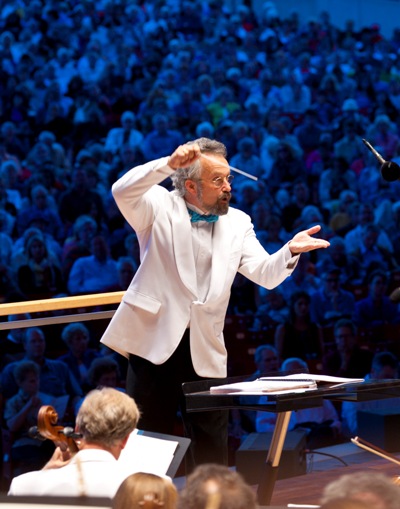Kalmar, Grant Park Orchestra open summer concert season in worthy style

It’s usually rain that threatens the opening night of the Grant Park Music Festival but this time it was a musicians contract.
Negotiations went down to the wire this year with the previous contract having expired last month. On Tuesday the Grant Park Orchestral Association cancelled the opening concert when musicians rejected a three-year contract. The cancellation was un-cancelled three hours later when the sides came to terms.
Despite the contentious brinksmanship 24 hours earlier, there didn’t seem to be any hard feelings Wednesday night at the Pritzker Pavilion. There were smiles aplenty from Kalmar as well as the musicians of the Grant Park Orchestra on a plu-perfect summer evening that drew an overflow crowd to Millennium Park.
The late settlement, unfortunately, meant that Wednesday’s concert took place with only a single rehearsal earlier in the day. That meant more than a few rough edges, though much of the playing was polished and committed on the first half of the evening.
Kalmar and the lakefront festival continue to carry the banner for American music far above any local organization and most any ensemble one can name across the country. There are a myriad of homegrown works on tap this summer, including Samuel Barber’s Essay No. 2 for orchestra, which opened the evening.
Barber packs a lot into this 11-minute work, which is in essence a non-programmatic mini-tone poem. Kalmer led a cogent, flowing performance that balanced the taut drama and lyrical unease, with nimble wind playing in the fugal section, building the arc to a muscular coda.
Francis Poulenc’s Concerto for Two Pianos is not exactly the most profound work ever written. Its hectic joie de vivre makes Saint-Saens seem like Max Reger and there’s more than a hint of the magpie in Poulenc’s themes. The shades of Mozart and Ravel hover close by, especially the Adagio of Ravel’s Concerto in G , which was premiered the same year Poulenc wrote this work.
Still, it’s an undeniably likable concerto and soloists Andrew von Oeyen and Fabio Bidini put across the breezy boulevardier esprit with great virtuosity and panache. Considering the lack of rehearsal, the two pianists played and echoed each others’ phrases as one. They threw off the silent-movie chase of the opening movement, brought refined elegance to the Larghetto, and displayed fine wit in the galumphing finale with its sudden throwaway coda. Kalmar and the orchestra provided alert and vital support.
Wednesday’s performance of the Mussorgsky/Ravel Pictures at an Exhibition required more forbearance. The lack of rehearsal time was manifest in the wobbly trumpet solo in the opening Promenade, a shaky tuba in “Bydlo,” dicey muted trumpet for Schmuyle, and a tentative “Tuileries.”
It’s a testament to Kalmar and the professionalism of the orchestra that this challenging showpiece still came off reasonably well with most of the portraits vividly characterized and solidly played.
Among the highlights were the mostly elegant and expressive saxophone solo in “The Old Castele,” an atmospheric “Catacombs” and fiery “Baba-Yaga.” Kamar took a quicker pace than is customary for the “Great Gate of Kiev” yet made a fresh case for his tempo—shearing off excess bombast while the final pages still had due weight and majestic impact.
Carlos Kalmar conducts the Grant Park Orchestra and Chorus in music of Beethoven, Aaron Jay Kernis and Michael Torke 6:30 p.m. Friday and 7:30 p.m. Saturday at the Pritzker Pavilion. gpmf.org.
Posted in Performances




